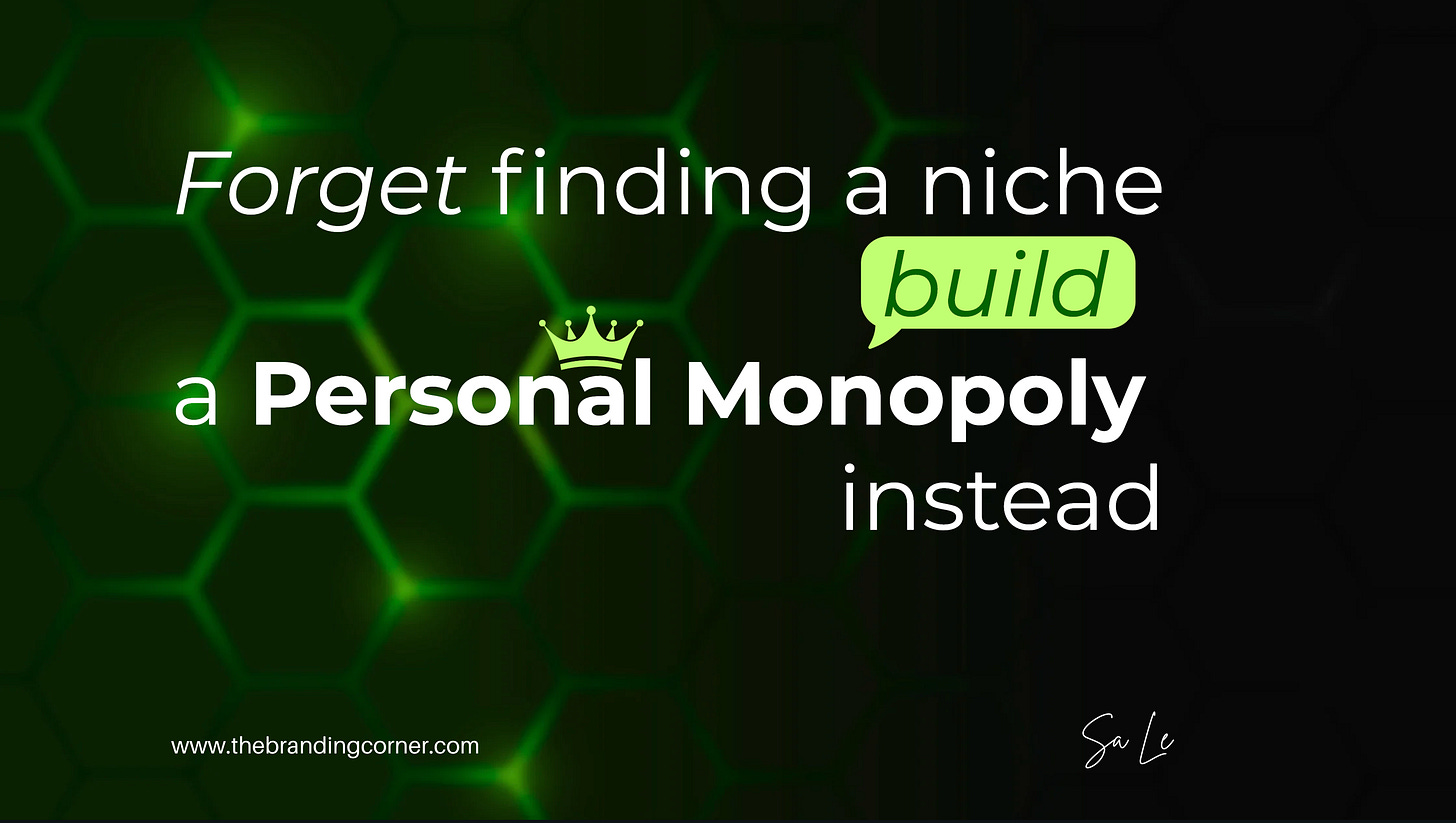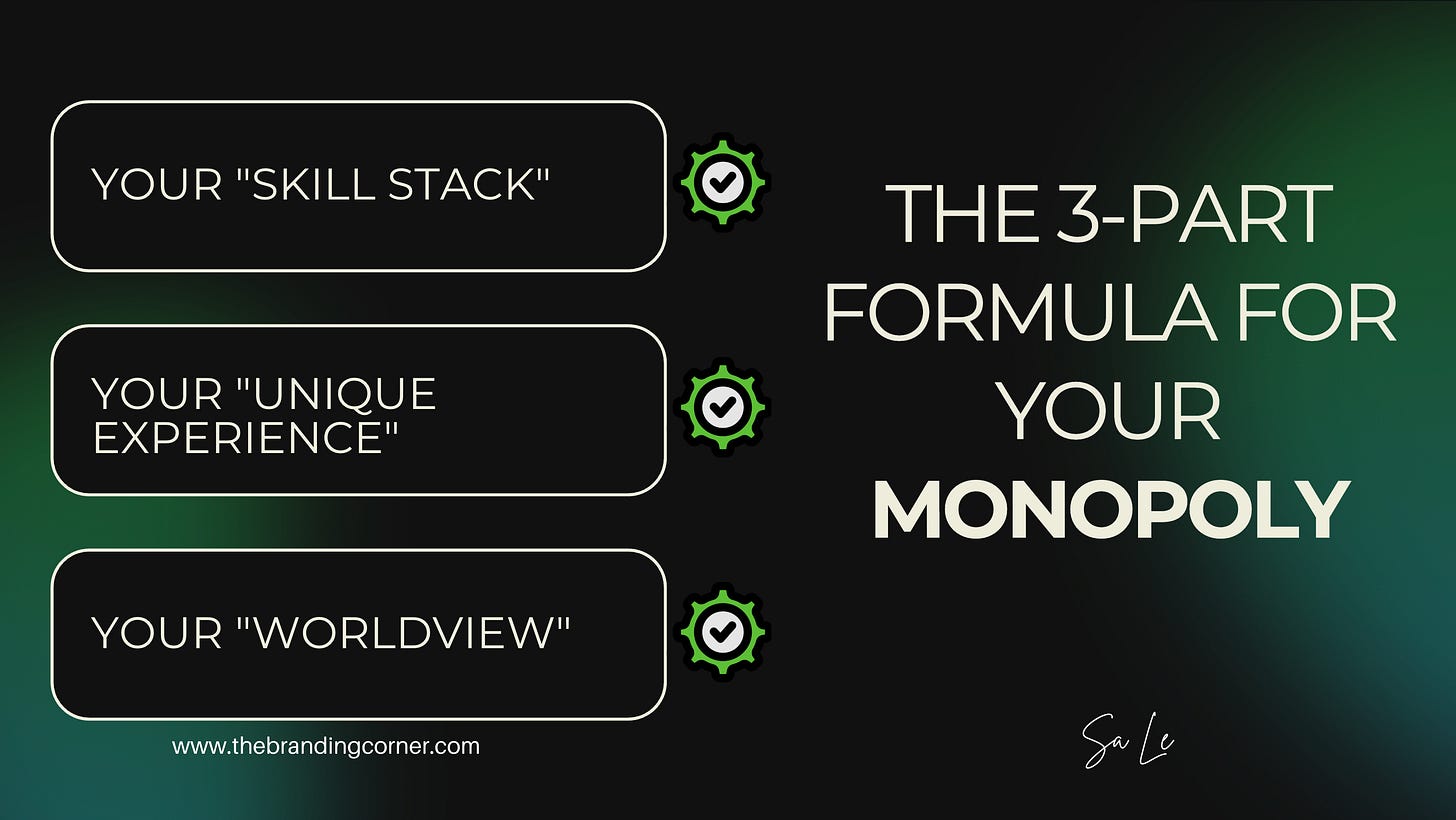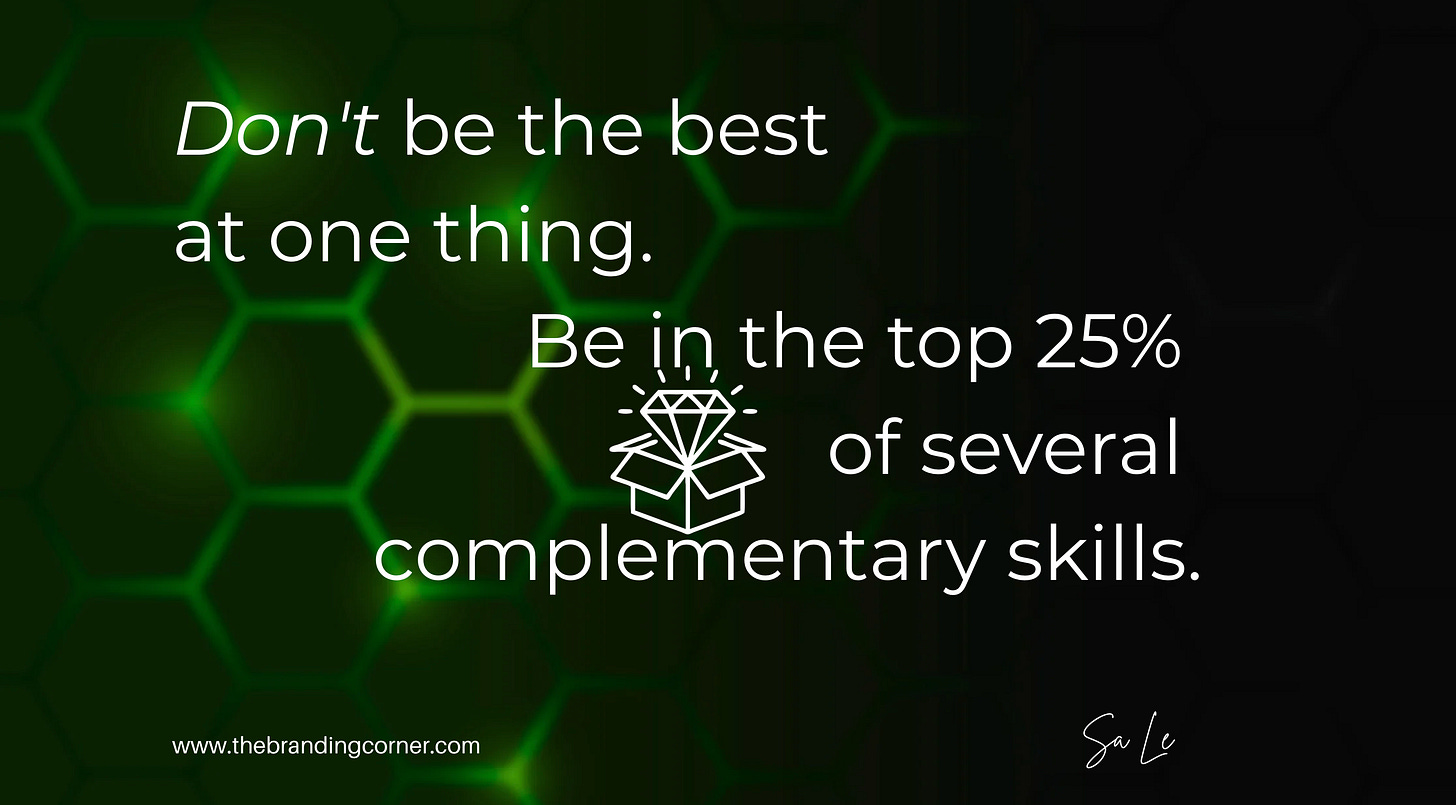Forget finding a niche and build a “Personal Monopoly” instead
Stop trying to fit into a niche. This post explains why the “niche” model is obsolete in the AI era and provides a 3-part formula to build a “Personal Monopoly,” making you a category of one.
For years, every expert has given you the same advice: “Find your niche.” You were told to niche down, then niche down again. You were told to become the “go-to expert” for “content marketing for SaaS startups.”
What if that is now terrible advice?
What if the strategy that was supposed to make you stand out is now the fast track to becoming invisible? The ground is moving beneath our feet, and the playbook for professional success is being rewritten.
The problem is that your “niche” is being commoditized by generative Artificial Intelligence.
The problem with niches in 2026
The “niche” model was built on information scarcity. If you were the person who knew the most about “SEO for dentists,” you held the keys. Your expertise was a scarce, valuable asset.
Today, that asset is no longer scarce.
Generative AI can produce “expert-level” content for almost any broad niche at nearly zero cost. An AI can instantly draft “5 SEO Tips for Dentists” or “A 10-Step Guide to Leadership.” The result is a deafening flood of generic, faceless, and soulless content that all sounds the same. In this environment, competing on expertise alone is a race to the bottom. You cannot be “more expert” than a machine that has processed the entire internet. You cannot be faster. And you cannot be cheaper.
This new reality creates a deep-seated consumer mistrust. Your audience is no longer just looking for information. They are drowning in it. They are desperately seeking authenticity, judgment, and perspective, three things a machine cannot manufacture.
This is where the old advice truly fails. It’s not just the AI problem. For years, this “find your niche” advice has penalized the “multipotentialite,” a person with a diverse background. Perhaps you’re one of them. You have 10 years of experience in corporate finance, but you’re also a skilled graphic designer. The “niche” model tells you this is a weakness, that you must pick one box.
This advice forces you to choose between being authentic and being marketable. This is a false choice. The strategic imperative is no longer to “find your niche.” It is to build a “Personal Monopoly.”
A niche is a crowded category where you compete with others. A Personal Monopoly is a new category of one, designed by you, that makes you the only person who can do what you do, in the way you do it. It’s not about being the best in one category. It’s about creating an entirely new category defined by your unique identity.
Part 1. What is a “Personal Monopoly?” (The 3-part formula)
A Personal Monopoly is a strategic positioning framework built on the unique, unassailable intersection of three core components. While AI can replicate any one of these components, it can never replicate their combination. This is your ultimate competitive advantage.
The formula is: Skill Stack + Unique Experience + Worldview = Your Personal Monopoly
Let’s break down each part.
Component 1. Your “skill stack” (what you do)
The old model pressures you to become the “top 1%” at a single, narrow skill. A Personal Monopoly is built on what Scott Adams, creator of Dilbert, calls a “Talent Stack.” The core idea is that it’s extraordinarily difficult to be the best at one thing, but it’s much easier to be in the “top 25%” of several complementary skills. Your power comes from the combination of your skills.
A “marketer” is a commodity. A “marketer who understands data analytics” is more valuable. A “marketer who understands data analytics and has a background in psychology” is a Personal Monopoly in the making.
Your diverse background is not a weakness. It is the raw material for your stack. A UX designer who also understands human psychology is no longer a “Jack of all trades.” They are a specialist in a new, high-value category.
Component 2. Your “unique experience” (what you’ve lived)
This is the component that is 100% AI-proof. Generative AI is trained on the past. It is an engine for common knowledge. It can summarize every book on marketing, but it cannot tell the story of the product launch you led that failed spectacularly, and the specific, painful lessons you learned that night.
Your Unique Experience is the unforgeable, human-only dataset that you possess. It’s your personal journey, your “cultural capital,” your failures, your industry background, and your specific, lived context.
This is what investor Naval Ravikant calls “specific knowledge.” He says, “Specific knowledge can’t be trained. If it can be trained, someone else can be trained for it... Specific knowledge is found by pursuing your genuine curiosity.”
My “17+ years working for global brands in both Europe and Vietnam” is not just a line on a resume. It is a well of specific knowledge. It means I see the world through a lens no one else has. AI can simulate viewpoints, but it “cannot replicate the authenticity of lived experiences and personal insights”. My experience is not just my proof of work. It is the source of my trustworthiness.
Component 3. Your “worldview & voice” (how you see it)
If your Skill Stack is what you do, and your Experience is why you’re qualified. Your Worldview is how you see the world, and it’s the most powerful part of your brand.
Your Worldview (or “brand philosophy”) is your unique “why,” your “living belief system,” your core conviction. It is the unique lens through which you apply your skills and experience.
AI has no “why.” It has no conviction. It cannot believe in anything. You can.
Maybe your Worldview is a “Hunter vs. Gardener” philosophy. Maybe it’s a belief in “Human Proof-of-Work” as the only defensible business model.
This Worldview, expressed in your authentic voice, is what makes you a leader, not just an expert. It acts as a filter. It will actively repel the wrong audience and forge an unbreakable bond with the right one. When you combine these three components, you create a market position that no one else can occupy.
Part 2. How to find and build your own personal monopoly
This is an actionable strategy. Moving from a generic “niche” to a powerful “Personal Monopoly” is a three-step process.
Step 1. Conduct a “monopoly audit”
You cannot build your monopoly until you’ve taken inventory. Answer these questions with brutal honesty.
Audit your skill stack:
What are 3-5 skills I have mastered to a “top 25%” level?
What skills do others consistently acknowledge in me?
What are my “motivating skills” (the ones that excite me) vs. my “burnout skills” (the ones I’m good at but secretly hate)?
Important question: Which of my skills, when combined, create a rare and valuable stack? (e.g., “coding + public speaking”).
Audit your unique experience:
What unique journey or industry background do I have?
What was my most successful project, and what unconventional thing did I do that made it successful?
Important question: What was my biggest failure, and what is the one specific, non-obvious lesson I learned from it?
Audit your worldview & voice:
What do I believe about my industry that most other “experts” disagree with?
What am I tired of hearing people say in my field?
Important question: If I had to give my core philosophy a name (like “Hunter vs. Gardener”), what would it be?
Step 2. Define your “category of one”
Your audit gives you the raw materials. Now, you must forge them into a single, clear positioning statement.
Bad xxample (Niche): “I am a content marketer for tech startups.”
Problem: You are competing with 10,000 other people and a million AI bots. This is an indefensible space.
Good example (Monopoly): “I am the strategist who helps tech leaders build ‘Personal Monopolies’ by combining data-driven marketing with authentic, human-centric storytelling.”
Analysis: This is a “category of one.” It defines the who (tech leaders), the what (Personal Monopolies), and the how, the unique Skill Stack (data + storytelling) that implies a Worldview.
Write your own “Category of One” statement. It’s your new North Star.
Step 3. Market your monopoly, not just your skills
This is the most critical part. Once you have your monopoly, you must stop creating generic “niche” content. Every piece of content you create must come from the intersection of your three components.
Don’t just write another post about “5 SEO tips.” Instead, write a post titled, “Why Most SEO tips fail for Marketers with a ‘Gardener’ Mindset.”
This title leverages your Skill Stack (SEO), filters it through your unique Worldview (’Gardener’ Mindset), and implies your Unique Experience (you’ve seen the common tips fail). You are no longer sharing generic advice. You are evangelizing your unique philosophy.
Part 3. Why is this the ultimate defense in the AI era?
This framework is not just a clever branding exercise. It is a fundamental shift in your economic model, making you defensible, attractive, and authentic.
It’s AI-proof: AI can copy a niche. It cannot copy you. AI is trained on public, common knowledge. Your Personal Monopoly is an emergent property of your unique, evolving humanity. It’s the sum of your specific Skill Stack, your private lived experiences, and your conviction-fueled Worldview. Your competitors can copy your AI prompts, but they cannot copy the perspective you gained from that one client disaster in 2019.
It attracts quality: When you compete in a “niche,” you are a commodity. When you define a “category of one,” you make competition irrelevant. You stop competing and start attracting. The right clients and collaborators will seek you out. They don’t want “a” marketer. They want you, the “data-driven storyteller.” They are hiring you for your judgment. As Seth Godin wrote, “You will never become a category of one if you run with the pack.”
It builds a real, authentic brand: A “niche” is a rented space. A “Personal Monopoly” is an owned asset, built on the foundation of your unforgeable, authentic identity. This is liberating. You no longer have to feel “flaky” for having diverse interests. Your diverse Skill Stack is your power. Your unique experiences are your most valuable data. Your contrarian worldview is your sharpest marketing tool. A Personal Monopoly gives you permission to finally be your full, authentic self... and proves that this is the single most pragmatic and profitable strategy of all.
Conclusion
Stop competing, start owning!
The old playbook is broken. “Finding a niche” is a defensive posture in a world of AI-driven content saturation. It’s a strategy for blending in. The future belongs to the individuals who stand out. Not by shouting the loudest, but by being the only.
Don’t try to be the best in a crowded category. Create your own.
The future of personal branding isn’t about fitting in. It’s about defining your own space so clearly, with such a unique combination of skills, experience, and philosophy, that you are the only one in it. The work is to audit your assets, define your category, and have the courage to market the unique, irreplaceable, and authentic you.
So, I’ll ask you: What’s your Personal Monopoly?





